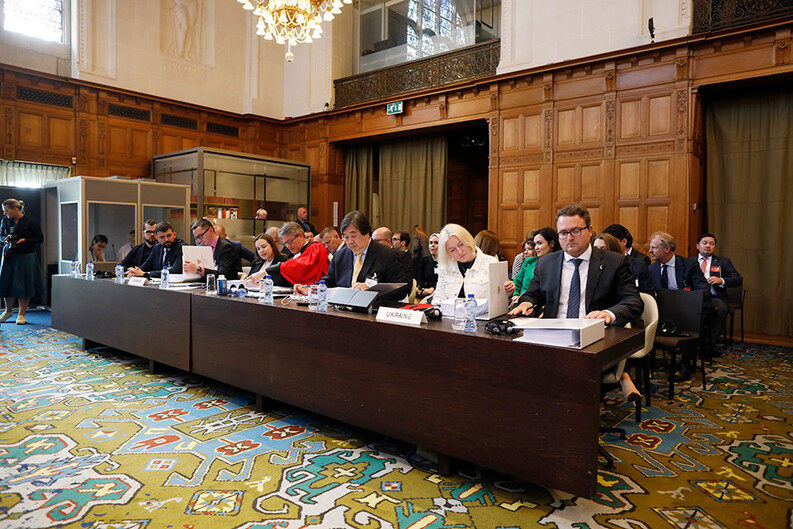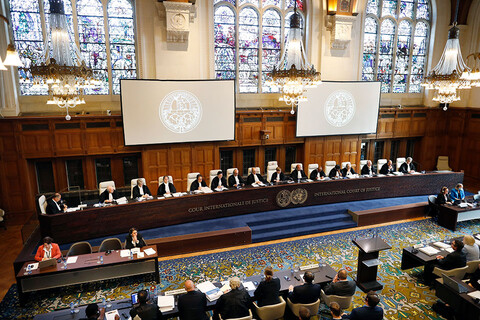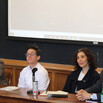Professor Koh Argues at the International Court of Justice on Behalf of Ukraine

Sterling Professor of International Law Harold Hongju Koh is among the lawyers representing Ukraine at the International Court of Justice (ICJ) in the Hague this month asking the court to declare Russia in violation of two international treaties.
Koh, a former U.S. State Department Legal Adviser and Assistant Secretary of State for Human Rights, presented two opening speeches and the closing argument on behalf of Ukraine in three argument sessions that spanned nearly two weeks.
Koh’s arguments began on June 6, when he argued in a morning session that Russia has violated its obligations under the International Convention for the Suppression of the Finance of Terrorism.
“When it could have instructed its officials not to fund groups committing violence against civilians, Russia did nothing,” Koh said in his presentation to the judges.
WATCH THE FIRST SESSION: Professor Koh at 38:50
Koh then opened the afternoon session that same day, arguing that Russia has also violated the U.N.’s International Convention for the Elimination of All Forms of Racial Discrimination for its abusive treatment of ethnic minorities in occupied Crimea.
Koh argued that Russia “pursues a long-term project of erasing the rights and culture that make Ukraine a proud multiethnic nation…But the path is finally clear for you to rule, on the merits, that Russia’s acts violate this historic Convention to Eliminate All Forms of Racial Discrimination,” a treaty the World Court has not construed on the merits until now.
WATCH THE SECOND SESSION: Professor Koh at 25:29
On June 12, Professor Koh gave the closing argument and urged the Court to define legal standards for the two treaties, order Russia’s compliance, and set a hearing date to determine full financial compensation for the injuries Russia has wrought.
“Russia believes it is above the law,” Koh said. “How does an international court push a lawless nation to obey the law, when it has consistently flouted that court’s lawful orders? … To ensure Russian accountability, ‘full reparation’ cannot mean half measures; it must include financial compensation and moral damages for the harm that Ukraine has suffered, both in its own right and parens patriae for its citizens, to be assessed in a subsequent phase of this proceeding.”
The Russian delegation is scheduled to close on June 14.
WATCH THE CLOSING SESSION: Professor Koh at 2:55:30
The ICJ is the United Nations’ court for resolving disputes between nations, established in June 1945 by the Charter of the United Nations and seated at the Peace Palace in The Hague (Netherlands).
A final decision in this case, which largely addresses Russian abuses from 2014–22, is expected by early 2024.

In March 2022, Koh previously presented Ukraine’s closing argument seeking preliminary relief in a second case against Russia, which addresses Russian abuses from its 2022 invasion to the present, by asking the ICJ to rule on Russia’s genocide allegations against Ukraine to support its claim to legal authority to take military action in and against Ukraine.
The next hearing in that case, in which more than 30 nations have intervened on Ukraine’s side, will be held this fall. In a third case pending before a Permanent Court of Arbitration panel sitting in the Hague, Koh’s team is challenging Russia’s maritime violations in the Black Sea and the Sea of Azov under the U.N. Convention on the Law of the Sea.
Koh is the Sterling Professor of International Law at Yale Law School, where he has taught since 1985, and served as Dean from 2004–09. He is one of the nation’s leading experts in public and private international law, national security law, and human rights. From 2009–13, he served as the 22nd Legal Adviser of the U.S. Department of State in the Obama Administration, and in 2021, he returned to the Office of the Legal Adviser at the start of the Biden Administration as Senior Adviser, the senior political appointee in that office. He is the author of many books and articles, most recently, a forthcoming book from Yale University Press, The National Security Constitution in the 21st Century.


